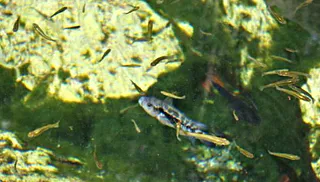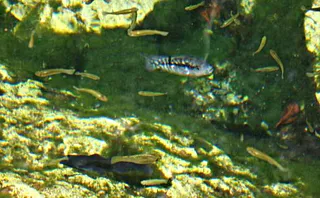Do female cichlids have shorter lifespan compare to male cichlids? Since females have the risk of being egg bound and eventually die for failure to release her eggs
Do female cichlid have shorter lifespan?
- Thread starter Rakeboy
- Start date
Egg bound susceptibility is not a myth at all, but it does vary by species. It's not an uncommon issue in Cyphotilapia gibberosa, goldfish, koi, or bettas, for example. In fact, I was a mod/admin for years on a very popular Cyphotilapia site (now defunct) and it was probably the most discussed health issue there. Over the 20-some years I kept them I personally lost three C. gibberosa kapampa to it and would have lost more if I hadn't ultimately figured out special precautions to deal with the issue.Being egg bound is so rare it's almost a myth. It technically CAN happen, but almost NEVER does.
However, at least ime, female cichlids don't necessarily live shorter lives,. As much as anything it's depended on individual fish ime. Among the longer lived cichlids I've had, besides Cyphotliapia (including females, once I figured out the egg bound issue), was a female Heros sp. rotkeil that lived to over 17 years.
Last edited:
I've heard of 15-20 year old breeding pairs of convicts and jack dempsies. Egg production can stunt growth if breeding starts at a young age, but it doesn't seem to stop them from living.
Females in the aquarium typically have a shorter lifespan because they get wrecked by a male who always wants to spawn....
Agree, iespecially n the artificial, and often very limited space of an aquarium, females are often at a disadvantage, being very vulnerable to aggressive rutting males. Even what most people consider large aquariums, are mere puddles to fish like cichlids.Females in the aquarium typically have a shorter lifespan because they get wrecked by a male who always wants to spawn....
But I have also seen that happen to males in nature.
Often the older males, are pushed out by younger and more robust males, to less desirable territories,.
They could be less desirable because food is more scarce, or less safe, from predation or proper breeding sites are scarce.
I watched an old male Rocio, relegated to the mouth of an overhang in Cenote Cristalino, where less algae was growing, so less live bearer dithering activity, while young males had set up sites much more attractive to passing females, with sun, so lots of algae, lots of actively dithering live bearers.

And some older individuals succumb to fungal diseases after the many jousting battles with other males, and testing females.
I know its hard to see, but the lips of the Rocio above, are coated in fungus.
.


I get the feeling that once they get past their breeding prime in nature, its curtains (for both males and females) its not not far off.
it's actually EXTREMELY rare in bettas. And I have high suspicions that "egg bound dealths" are actually just misdiagnosed most of the time in any species.Egg bound susceptibility is not a myth at all, but it does vary by species. It's not an uncommon issue in Cyphotilapia gibberosa, goldfish, koi, or bettas, for example. In fact, I was a mod/admin for years on a very popular Cyphotilapia site (now defunct) and it was probably the most discussed health issue there. Over the 20-some years I kept them I personally lost three C. gibberosa kapampa to it and would have lost more if I hadn't ultimately figured out special precautions to deal with the issue.
However, at least ime, female cichlids don't necessarily live shorter lives,. As much as anything it's depended on individual fish ime. Among the longer lived cichlids I've had, besides Cyphotliapia (including females, once I figured out the egg bound issue), was a female Heros sp. rotkeil that lived to over 17 years.
I'm not a cichlid guy, so I'm really just guessing, but...I sometimes wonder if females in captivity are simply worn out by the tendency for some people to breed their fish, then remove the fry to rear separately. With most of the cichlids I have managed to breed, this has resulted in the pair quickly spawning again...and they will continue to do so as long as they keep losing their broods to overzealous aquarists.
Aside from laziness, this has always been one of the reasons why I like to allow the parents to rear their young naturally.
So the female should have had a period of at least a couple weeks during which she would have been guarding and caring for eggs and then fry. This would have given her a chance to renew her body's resources...but instead, her body responds by producing eggs again and again within an unnaturally short timespan. I have to think this is putting a strain on her, perhaps not actually killing her but generally just "burning her out" prematurely. Add to that the attentions of a larger male who is also back into spawning mode sooner than he ideally should be, and it seems as though these females may be destined to be short-lived baby-making machines. Thought and comments would be welcome.
Interesting to hear about the egg-bound problem. This was not uncommon among some female snakes back when I was breeding reptiles; I honestly had no idea it was a fish thing as well.
Aside from laziness, this has always been one of the reasons why I like to allow the parents to rear their young naturally.
So the female should have had a period of at least a couple weeks during which she would have been guarding and caring for eggs and then fry. This would have given her a chance to renew her body's resources...but instead, her body responds by producing eggs again and again within an unnaturally short timespan. I have to think this is putting a strain on her, perhaps not actually killing her but generally just "burning her out" prematurely. Add to that the attentions of a larger male who is also back into spawning mode sooner than he ideally should be, and it seems as though these females may be destined to be short-lived baby-making machines. Thought and comments would be welcome.
Interesting to hear about the egg-bound problem. This was not uncommon among some female snakes back when I was breeding reptiles; I honestly had no idea it was a fish thing as well.
No, it's quite obvious in many cases, has clearly recognizable symptoms, and has been well documented. There's also a fair bit of aquaculture science literature on it-- which I've researched in years past trying to figure it out-- as researchers have tried to determine causes, how to treat, prevent, etc.I have high suspicions that "egg bound dealths" are actually just misdiagnosed most of the time in any species.
I prefer not to argue and don't like to be this blunt, but you've simply got this wrong. Yes, it is rare in many species and you may have never seen it yourself, but that hardly makes it a myth. As I said, some species, or some cultivated derivations of species, are more susceptible to it than most. I'm simply not going to argue over which species see it more than most species in which it's typically rare. Of course, like anything it may be potentially be misdiagnosed by some, but there's not much mistaking it when you have real-life experience. Almost none at all, really. If anything I've seen some who aren't familiar with the condition not recognize what it is, even when it's fairly apparent to an experienced eye.
There's not much mistaking seeing a female fish that's quite obviously carrying eggs and on schedule in her spawning cycle subsequently fail to spawn, gradually swell up in the abdomen, then in the genital area, become listless, start breathing fast, have a genital area rupture, sometimes releasing a combination of puss and damaged/decaying eggs, then quickly go downhill from there, usually leading to the death of the fish. Go through this a few times, or see it for yourself, or have some obvious near misses where you were able to save the fish, and you learn to (or darn well better learn to) recognize the earlier stages when there are much better odds of saving the fish.
...Or little mistake in seeing a female fish in a susceptible species start down this road before you notice, get to a dangerous stage of it by the time you do, but being to save her because you know what you're doing.
Last edited:
Re-read - I never said it was a myth, I said it was so rare it comes close.
It certainly is not common enough in most species to be a considered a general consideration of a potentially shorter lifespan in females. Anything is possible, of course. But it's not nearly as big a concern in most species as it seems some sources would have people believe.
It certainly is not common enough in most species to be a considered a general consideration of a potentially shorter lifespan in females. Anything is possible, of course. But it's not nearly as big a concern in most species as it seems some sources would have people believe.









